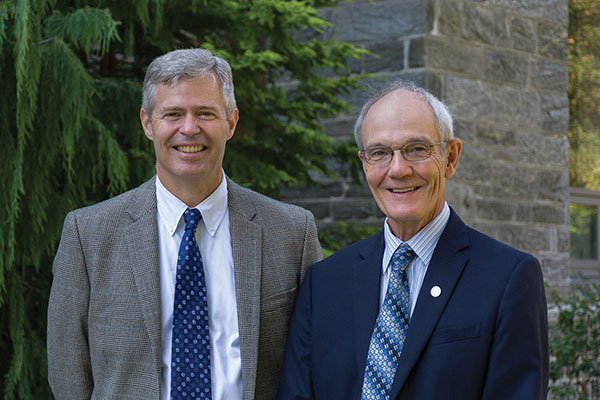
On July 1, 2017, United Lutheran Seminary was launched on campuses in Gettysburg and Philadelphia, Pennsylvania. United was formed through a consolidation process led by the two predecessor schools’ presidents, Michael Cooper-White and David Lose.
Last year, the pair wrote for In Trust on the lessons they had learned (www.intrust.org/presidents-reflect). Below they share their hindsight on the process and insights that may benefit others exploring collaboration.
Now senior pastor of Mt. Olivet Lutheran Church in Minneapolis, Lose continues his popular blog for preachers. In retirement, Cooper-White is consulting and supporting Lutheran students at Union Seminary in New York.
 |
David Lose and Michael Cooper-White
Credit: Merri Brown |
Q Last year when you wrote a piece for In Trust you were in the middle of the consolidation process. Now that it’s behind you, how does it feel?
A There seems to be a consensus that it was the right move at the right time. Seeing a significant increase in new students is especially gratifying and confirms our judgment that offering more generous scholarships and an innovative new curricular approach offsets any wariness prospective students would have about enrolling in a “new,” unproven school.
As the ones who bore a major share of the responsibility for causing disruption in many people’s lives, there’s a measure of regret, even as we feel grateful for the opportunity to help discover a future for our schools they would otherwise not have had. And we’re both dealing with our own separation from colleagues and institutions that were part of our lives and vocational callings.
Q Looking back, what do you think went well with the consolidation?
A While ambitious, a compressed consolidation timeline of 18 months sustained the momentum. Hopefully, our goal of offering support for colleagues enduring anxiety about their futures was realized by avoiding a prolonged multi-year process. We were also fortunate that factors beyond our control did not prolong the process as we feared. From our accreditors, to state and federal Department of Education personnel, we found those who had to give their approval to be cooperative and supportive. We also had extremely competent legal counsel.
Q Leaders of other such processes have faced lawsuits and other very difficult relationship severing. Can you advise those who may lead elsewhere on that score?
A We won’t sugarcoat the fact there were some white-knuckle moments on the personnel front. But both predecessor schools, and now United Lutheran Seminary, are blessed with faculty and staff committed to a calling. In the end, our boards readily embraced our proposals for employee severance benefits and provided ongoing health benefit coverage for those who needed it during transition to retirement or employment elsewhere.
Perhaps the most important advice on working through personnel issues is simply to be present and attentive to colleagues who are experiencing significant disruption. Be ready to listen. Critical moments in our transition, when things could easily have gone south, were alleviated by a commitment to listen carefully, reflect back what we were hearing, and continue the conversation. Our plans were always improved through conversation with key constituents, especially our staff and faculty.
Q You’ve pointed to your harmonious working partnership as a key ingredient. But were there some moments when you disagreed?
A Of course. We’re both strong individuals with deep convictions. While we each endeavored to serve the emerging new venture, we also retained loyalty to and deep affection for those colleagues we had recruited and formed into our own presidential teams. A good decision early in the process was to focus on our areas of interest and expertise. One of us [David Lose] had experience as a dean at another school, which made him a natural to work with the deans and others in curricular design and accreditation. The other one of us [Michael Cooper-White] is more of a numbers geek and has also written and taught about administration, so he worked with task forces overseeing real estate, budget development, and staffing.
Even with these divisions of labor and the strong relationship we built, there were still times of misunderstanding and disagreement. The key, again, was communication. And the more significant or intense the subject matter, the more immediate the conversation. While some of those conversations were difficult, each was also shaped by our shared commitments to candor, the joint venture of creating a new school, and each other.
Q And are there some lingering disappointments?
A Two come to mind.
- At a certain point, since we recognized we would not be leaders of United Lutheran, we handed off to senior staff a good deal of the decision making affecting the future institution, perhaps more than was wise. They had not had the same benefit as the two of us in terms of relationship-building, and they experienced tensions and strong pressures from colleagues on each campus to represent its interests.
- We had hoped to see things further along in terms of major real estate realignments on both campuses. It was a disappointment to leave some of these matters on the table for our successor.
Q What advice have you offered your successor?
A We know we left many tasks unfinished and many loose ends untied as we concluded our tenures. To a significant degree, the process of becoming United Lutheran has only just begun. It will not be finished even during the tenure of our successor, Dr. Theresa Latini. Our advice to her would be: Take it one day at a time, trusting the good people who work with you, rely on God’s guiding Spirit, and rejoice in the delight of leading such a strong institution of theological education and leadership formation.